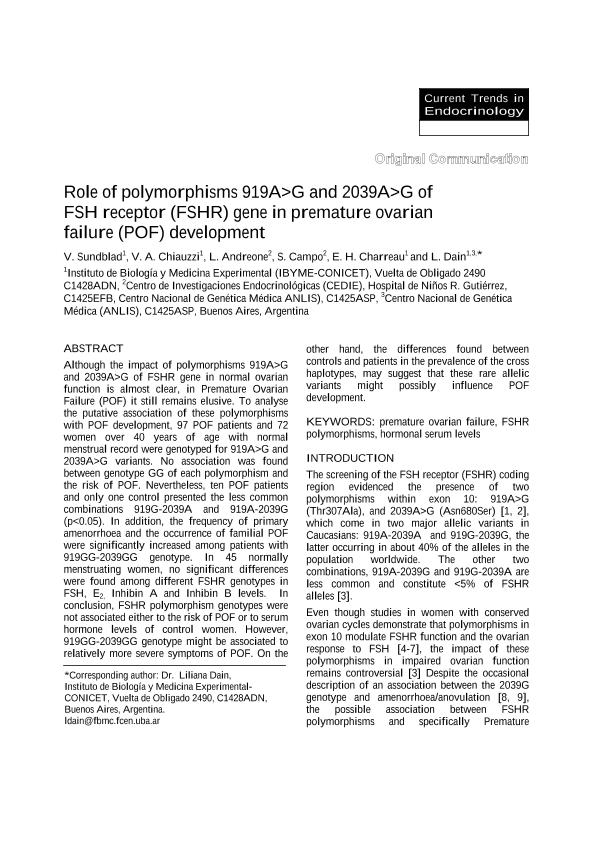Artículo
Role of polymorphisms 919A>G and 2039A>G of FSH receptor (FSHR) gene in premature ovarian failure (POF) development
Sundblad, Victoria ; Chiauzzi, Violeta Alicia
; Chiauzzi, Violeta Alicia ; Andreone, Luz
; Andreone, Luz ; Campo, Stella Maris
; Campo, Stella Maris ; Charreau, Eduardo Hernan
; Charreau, Eduardo Hernan ; Dain, Liliana Beatriz
; Dain, Liliana Beatriz
 ; Chiauzzi, Violeta Alicia
; Chiauzzi, Violeta Alicia ; Andreone, Luz
; Andreone, Luz ; Campo, Stella Maris
; Campo, Stella Maris ; Charreau, Eduardo Hernan
; Charreau, Eduardo Hernan ; Dain, Liliana Beatriz
; Dain, Liliana Beatriz
Fecha de publicación:
10/2010
Editorial:
Research Trends
Revista:
Current Trends in Endocrinology
ISSN:
0972-947X
Idioma:
Inglés
Tipo de recurso:
Artículo publicado
Clasificación temática:
Resumen
Although the impact of polymorphisms 919A>G and 2039A>G of FSHR gene in normal ovarian function is almost clear, in Premature Ovarian Failure (POF) it still remains elusive. To analyse the putative association of these polymorphisms with POF development, 97 POF patients and 72 women over 40 years of age with normal menstrual record were genotyped for 919A>G and 2039A>G variants. No association was found between genotype GG of each polymorphism and the risk of POF. Nevertheless, ten POF patients and only one control presented the less common combinations 919G-2039A and 919A-2039G (p<0.05). In addition, the frequency of primary amenorrhoea and the occurrence of familial POF were significantly increased among patients with 919GG-2039GG genotype. In 45 normally menstruating women, no significant differences were found among different FSHR genotypes in FSH, E2, Inhibin A and Inhibin B levels. In conclusion, FSHR polymorphism genotypes were not associated either to the risk of POF or to serum hormone levels of control women. However, 919GG-2039GG genotype might be associated to relatively more severe symptoms of POF. On the other hand, the differences found between controls and patients in the prevalence of the cross haplotypes, may suggest that these rare allelic variants might possibly influence POF development.
Palabras clave:
Fsh Receptor
,
Premature Ovarian Failure
Archivos asociados
Licencia
Identificadores
Colecciones
Articulos(IBYME)
Articulos de INST.DE BIOLOGIA Y MEDICINA EXPERIMENTAL (I)
Articulos de INST.DE BIOLOGIA Y MEDICINA EXPERIMENTAL (I)
Citación
Sundblad, Victoria; Chiauzzi, Violeta Alicia; Andreone, Luz; Campo, Stella Maris; Charreau, Eduardo Hernan; et al.; Role of polymorphisms 919A>G and 2039A>G of FSH receptor (FSHR) gene in premature ovarian failure (POF) development; Research Trends; Current Trends in Endocrinology; 4; 4; 10-2010; 21-27
Compartir



